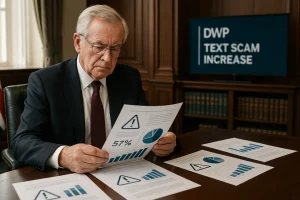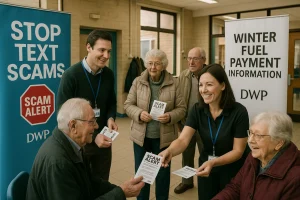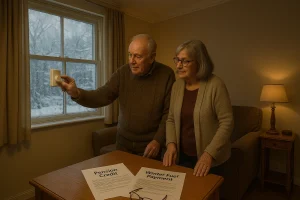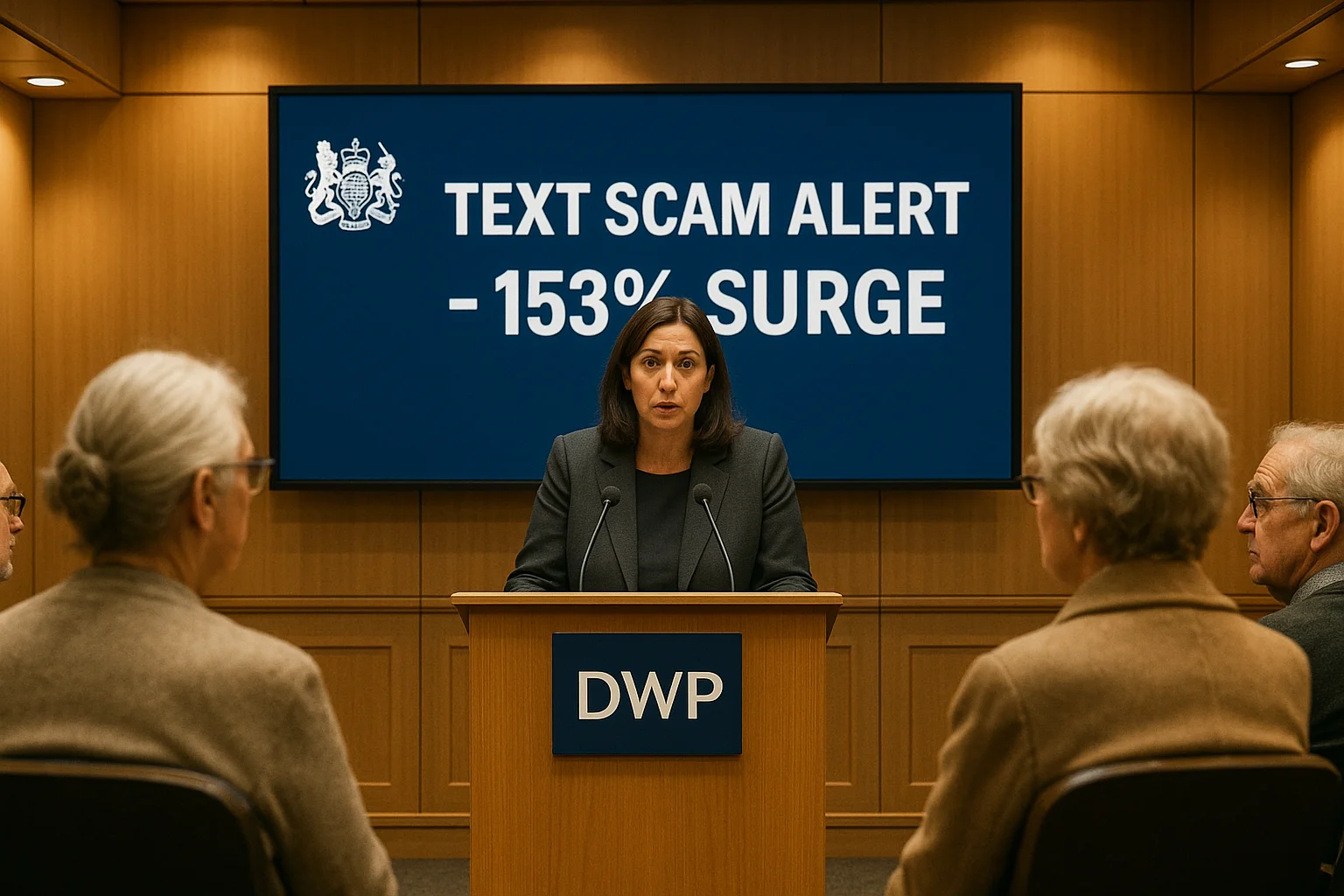The UK Government has issued a critical warning regarding fraudulent DWP text messages targeting pensioners. With a 153% increase in scam reports linked to Winter Fuel Payments, authorities are urging recipients to stay vigilant.
Criminals are posing as officials to deceive vulnerable individuals into sharing personal and banking information.
This blog explores how these scams work, who is most at risk, and what measures the government and public can take to stay protected during the Winter Fuel Payment season.
Why Has the Government Issued a DWP Text Message Warning?

The Department for Work and Pensions (DWP), along with HM Revenue & Customs (HMRC), has issued a nationwide warning following a sharp increase in scam activity targeting pensioners.
In the last week of September 2025, reports of fraudulent DWP-related text messages rose by 153%, with opportunistic criminals attempting to deceive older individuals ahead of the Winter Fuel Payment distribution.
This warning has prompted an urgent call to action by the government, which is working to raise public awareness and prevent pensioners from falling victim to these phishing attempts.
Scammers have taken advantage of the seasonal rollout of Winter Fuel Payments, using it as a cover to contact vulnerable individuals under false pretences.
HMRC’s data shows this surge is one of the most significant spikes in text scam referrals this year, and it coincides precisely with the period leading up to when these vital payments are made.
The rise in cases is especially concerning given that many elderly citizens rely on this financial support during the winter months.
In response, the government has launched targeted campaigns across various platforms to ensure the public is properly informed about what these scam messages look like and what steps they should take if they receive one.
What Are These DWP Scam Text Messages About?
Fraudsters are impersonating DWP officials and sending texts that appear to be legitimate. The messages often claim that recipients must confirm personal details or apply to receive their Winter Fuel Payment.
These communications may look genuine, often including government-style language or references to benefits and entitlements, but they are designed to collect personal information for malicious use.
The scam messages typically encourage pensioners to click on links to fake websites or enter details into online forms. In some cases, individuals are told their payments are delayed or at risk if they fail to take immediate action. The use of urgency and fear is a common tactic in these scams.
These fraudulent texts frequently include:
- Requests to verify bank details to process a payment
- Instructions to apply for Winter Fuel Payments online
- Notifications of “missed” payments requiring further action
- Hyperlinks to cloned websites resembling GOV.UK pages
These text messages are often sent in bulk to random numbers, with scammers hoping a small percentage of recipients will fall for the ruse. The issue is exacerbated by the realistic appearance of the messages and the timing, which coincides with the real Winter Fuel Payment schedule.
How Can Pensioners Protect Themselves from DWP Text Scams?

The DWP has reiterated that legitimate communication about Winter Fuel Payments will never ask for sensitive information via text message. Eligible individuals do not need to apply for these payments as they are processed automatically.
To avoid falling victim to these scams, individuals should:
- Avoid clicking on any links within unsolicited messages
- Never provide bank or personal details in response to a text
- Use official channels to verify the legitimacy of any communication
- Forward suspicious messages to 7726, a free service used to report scam texts to mobile providers
In addition to these precautions, friends and family of pensioners should encourage conversations around online safety, particularly for those who may be unfamiliar with identifying scams. Simple awareness can prevent financial loss and emotional distress.
When Will Winter Fuel Payments Be Made and How Are They Delivered?
Winter Fuel Payments are issued automatically between mid-November and December 2025. Most pensioners will receive a notification letter by post in October or November that confirms the payment amount and delivery date.
There is no need to apply or provide any personal details to receive the payment. If you’ve received a Winter Fuel Payment in previous years and your circumstances haven’t changed, you should receive it as usual without taking any action.
Payments are made directly into the recipient’s bank account. No text message or email is required or sent to trigger this process.
Below is a summary table outlining the key facts about Winter Fuel Payments:
Winter Fuel Payment Details
| Aspect | Information |
| Payment Period | Mid-November to December 2025 |
| Application Required? | No – payment is automatic |
| Confirmation Letter Sent? | Yes, in October or November |
| Payment Method | Direct bank transfer |
| Communication Method | Post only – no requests by text or email |
If an individual does not receive a payment by late December, they should contact the Winter Fuel Payment helpline using the official number listed on the GOV.UK website.
Delays can occur in rare cases, particularly for those who recently moved, changed bank accounts, or updated other personal details with DWP.
Who Is Most at Risk from These Scam Messages?
The current wave of scam messages pretending to be from the Department for Work and Pensions is particularly concerning because it targets some of the most vulnerable individuals in society. Understanding who is most at risk is critical for developing better protection strategies.
Pensioners Living Alone
Older adults who live alone often have less day-to-day support and are more likely to handle correspondence independently. Without someone to double-check suspicious messages or explain unusual texts, they are more vulnerable to falling for a convincing scam.
Scammers often exploit isolation, knowing that people living alone may not have immediate access to help or advice. These individuals might be more inclined to follow the instructions in a message out of caution or confusion.
Low-Income Older Adults
Those on fixed or limited incomes are especially susceptible to scams that mention financial assistance or delayed payments. A fraudulent message implying that a Winter Fuel Payment is in jeopardy can cause panic, especially for someone relying on that money to heat their home.
These individuals may be more likely to respond to scam messages out of urgency and fear of losing critical support. The emotional stress of managing bills and energy costs during winter makes financial scams even more effective.
People With Limited Digital Literacy
Digital literacy remains a significant barrier for many older people. Not all pensioners are familiar with how official communications from DWP or HMRC are typically handled, making it difficult for them to identify a fake message.
Fraudulent texts often mimic official formatting, use government logos, and include legitimate-sounding language. Without the ability to differentiate between real and fake messages, older individuals may unknowingly provide sensitive information.
Elderly Individuals with Cognitive Impairments
People suffering from early-stage dementia or memory loss may not remember receiving previous communications and might be more easily influenced by scam messages. These individuals can be targeted multiple times, as fraudsters often share lists of previous victims or potential leads.
In such cases, scams don’t just result in financial loss, they can also increase anxiety, confusion, and distress.
Lack of Family or Community Support
Pensioners without close family, carers, or regular community support are more likely to be exposed to scams without intervention. When no one is checking in regularly, fraudulent activity can go unnoticed and unreported for extended periods.
Support networks are crucial in preventing scams. In their absence, vulnerable individuals are often left to make decisions on their own, even when uncertain about the legitimacy of a message.
What Is the Government Doing to Tackle the Rise in Pensioner Scams?

Recognising the severity of the threat posed by fake DWP messages, the UK Government has ramped up efforts to educate the public, disrupt fraud networks, and safeguard vulnerable groups.
This multi-agency response involves awareness campaigns, partnerships with trusted organisations, and technological tools to report and block scams.
National Awareness Campaigns
The Department for Work and Pensions has launched a high-profile social media campaign across platforms like Facebook and X (formerly Twitter).
These campaigns are designed to educate the public on how to spot scam messages and encourage safe digital behaviour.
Posts include examples of what scam messages might look like, reminders of official DWP procedures, and step-by-step instructions on how to report suspicious content.
The aim is to create a widespread understanding of the issue ahead of the Winter Fuel Payment schedule.
Collaboration With Anti-Fraud Organisations
The government is working closely with Action Fraud, the UK’s national fraud and cybercrime reporting centre. This partnership ensures that intelligence on scam patterns and new fraud tactics is shared promptly with law enforcement and telecoms companies.
Additionally, Independent Age is assisting with outreach efforts, using their experience working with older people to ensure communications are accessible, clear, and effective.
Their helpline supports elderly individuals who may have received scam texts and offers practical advice on how to proceed.
Use of Mobile Reporting Services
To directly address the method of contact used by scammers, the government is promoting the use of the 7726 text service.
This allows mobile users to forward suspicious texts to their provider free of charge, helping telecom companies identify and block scam numbers more quickly.
This real-time reporting tool is an essential line of defence against evolving fraud tactics, especially during high-risk periods like the winter benefits season.
Emphasis on Official DWP Procedures
To reduce confusion, the DWP is making efforts to clarify its communication practices. The department emphasises that:
- Winter Fuel Payments are made automatically
- No texts, emails, or calls are used to request personal or bank details
- All official communications are made through letters or secure portals
Clear messaging around these procedures is being included in official mailings and government website updates, ensuring that pensioners know what to expect and what to avoid.
Strengthening Community Outreach
Local councils, GPs, libraries, and community centres are being encouraged to display printed materials warning about the rise in text scams. By reaching people where they already go for trusted information, the government hopes to close the information gap for individuals who may not use the internet regularly.
This localised approach is especially important for reaching those with limited access to national media or digital platforms. Printed posters, community talks, and support groups are all part of the wider campaign.
Where Should People Report Suspicious DWP Text Messages?
Anyone who receives a suspicious message that appears to be from DWP should take the following actions:
- Forward the message to 7726. This allows mobile providers to block the sender and investigate further.
- Avoid clicking on links or responding in any way to the text message.
- Contact the DWP or HMRC directly through verified channels if there are any doubts about the authenticity of a communication.
- Call Independent Age on their free helpline at 0800 319 6789 for guidance on dealing with scams.
For scams relating specifically to HMRC, such as tax or benefit-related fraud, individuals can also report:
- Emails to phishing@hmrc.gov.uk
- Suspicious texts to 60599
- Scam phone calls through the GOV.UK reporting portal
The DWP and HMRC are also encouraging family members and carers to play a role in helping elderly relatives stay alert. A quick check of a suspicious message can prevent a potentially costly mistake.
How Else Can Pensioners Receive Help With Winter Fuel Costs?

In addition to the automatic Winter Fuel Payment, the UK government offers several other benefits to help pensioners manage their energy bills and overall cost of living during the colder months.
Additional Support Options:
- Pension Credit: Provides extra income for pensioners on low incomes. Worth an average of £4,300 per year, it also acts as a gateway to other support such as housing benefit and council tax reduction.
- Attendance Allowance: Available for those with care needs, with an annual value of more than £5,740.
- Cold Weather Payment and Warm Home Discount: Seasonal schemes designed to assist with energy costs, depending on the weather and household circumstances.
Applications for these benefits must be made through official government portals. Pensioners should avoid applying through links received via text or email. Eligibility criteria and detailed application guidance are available on the GOV.UK website.
It is essential for pensioners and their families to remain informed about their entitlements and stay updated on legitimate government communications. This ensures that they receive all the help they are entitled to while avoiding scams that could compromise their financial security.
Conclusion
As Winter Fuel Payments approach, it is essential for pensioners and their families to remain alert to fraudulent text messages.
The Department for Work and Pensions will never request bank details via text, and legitimate payments are made automatically.
Understanding how to identify, report, and respond to scams is vital in preventing financial loss.
By staying informed and using official communication channels, pensioners can protect themselves and others from these increasingly sophisticated phishing attempts across the UK.
FAQs
How can I tell if a text message from the DWP is fake?
Legitimate DWP messages will never ask for personal or banking information via text. If a message includes links or urgent requests, it is likely fraudulent.
What should I do if I clicked on a scam link?
If you clicked on a suspicious link, do not enter any personal information. Run a virus scan on your device, contact your bank, and report the incident to Action Fraud.
Will the government ever send application links for Winter Fuel Payments?
No. Winter Fuel Payments are issued automatically. The government will not send application links via text or email.
Are all pensioners eligible for Winter Fuel Payments?
Most pensioners over a certain age who live in the UK during the qualifying week are eligible. You can check eligibility on the official GOV.UK website.
Can these scams also come through email?
Yes. Phishing emails are also used by scammers pretending to be government officials. Treat any unsolicited emails with caution and report suspicious ones.
What is the 7726 service and how does it work?
7726 is a free service that allows mobile phone users to report scam texts directly to their provider. Forwarding texts to this number helps stop scammers.
How do I apply for Pension Credit or Attendance Allowance?
You can apply for both through the GOV.UK website or by calling the relevant government departments. Do not apply through links in unsolicited messages.

Leave a Reply